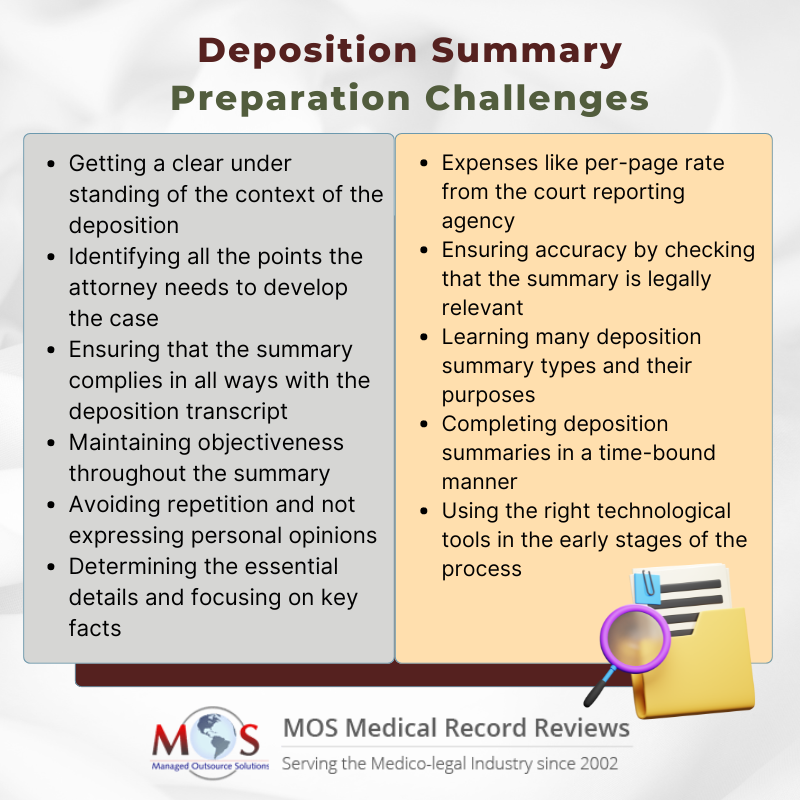A deposition summary is a synopsis of the main points of the testimonial included in the deposition transcript. They are condensed, objective and accurate. The essential and legally valid points can be extracted from deposition summaries as they are in congruence with the original deposition’s lines and pages. Even though deposition summaries serve as a source of quick reference, compiling them with legally relevant points in a time-bound manner is quite a challenge. Attorneys face many challenges in preparing a deposition summary.
These summaries support attorneys by:
- facilitating the preparation for pretrial motions and subsequent depositions
- assisting in the preparation of trial witness examinations
- highlighting successive discovery demands and responses, aiding in the preparation of interrogatories
- identifying noteworthy testimony and addressing concerns that may lead to witness impeachment at trial
There are different types of summaries that are helpful in court and throughout the pretrial phase. Professional providers of medical review services can prepare deposition summaries with utmost convenience. The documentation process not only includes word by word transcripts of court depositions, meetings, briefs, testimonials of the witnesses, and legal examinations but also more information that gives a concise overview of the critical information of the trial.
Ready to simplify your summary preparation process?
Let our experienced medical record review team handle it.

Major Challenges in Preparing a Deposition Summary
- Volume of information: Depositions are not clear narratives. These contain a vast amount of information, including witness testimonies, exhibits, and transcripts, making it difficult to extract the essential points. This sheer volume of information makes it difficult to identify the key points relevant to the case and separate them from the background noise.
- Complexity of legal language: Depositions often contain complex legal terminology and nuanced discussions, requiring a deep understanding of legal concepts to accurately summarize. Even a single misinterpreted legal term or inaccurately summarized conversation can have significant consequences for the case.
- Determining the essential details: This can be rather challenging. Attorneys and paralegals may find it difficult to find the right balance of summary and specificity, and focus on the important facts. Extracting the most relevant information from lengthy depositions while omitting irrelevant details is crucial for providing concise and impactful summaries. To write a good summary, one needs to fully comprehend the basis of the complaint. It is important to isolate particular statements/allegations, and see whether they appear in the transcript.
- Time constraints: Summarizing depositions is a time-consuming process, which involves scheduling meetings with the witnesses, recording their statements, cross-checking the testimonials, discovering evidence and word-by-word conversion of the verbal content. Attorneys may require summaries within tight deadlines, necessitating efficient summarization processes to meet their needs promptly.
- Objectivity and accuracy: Summaries must remain objective and accurately reflect the content of the deposition, avoiding any bias or misinterpretation that could affect legal proceedings. They should also be well-organized and presented in a format that is easily digestible for attorneys, ensuring clarity and readability.
- Legal strategy alignment: The summary should align with the attorney’s legal strategy, highlighting information that supports their case while identifying potential challenges or contradictions in witness testimonies.
- Lack of technology: Knowing the right technical tools during the early stages of the litigation process makes the pre-trial process seamless. Managing a litigation case from beginning to end is a difficult task. Gaining mastery of complicated fact patterns, chronicling evidence, and analyzing deposition testimony from complex and document-intensive transcripts is easier with the assistance of the right software. Innovative technology has to penetrate the process to facilitate pre-trial analysis and collaboration. Technological tools can streamline the litigation process by collaborating and sharing notes about case-related evidence and documents.
Overcoming these challenges requires proper attention to detail, legal expertise, and effective communication between the summarizer and the attorney.
Compressing lengthy transcripts to deposition summaries can be efficiently done with the assistance of a medical record review company. Professional companies prepare summaries with the support of skilled and trained professionals who understand and have experience in all areas of law.
FAQs
What types of cases can benefit from deposition summary preparation?
Summary of deposition transcripts is crucial for legal cases across various practice areas, including civil litigation, personal injury, employment disputes, family law matters, and more. Regardless of the case type or complexity, these summaries help attorneys simplify the review process and extract relevant information efficiently.
What is the process involved?
Experienced legal professionals review deposition transcripts, extract relevant information, and reduce it into a concise and organized format. The process involves thorough analysis, identification of key testimony, summarization of crucial points, and formatting according to the attorney’s preferences or case requirements.
How can I ensure the accuracy and quality of summaries?
When selecting a service provider, it’s essential to choose a reputable firm with a track record of delivering accurate and high-quality summaries. Look for providers who employ experienced legal professionals, have stringent quality control measures in place, and offer opportunities for attorney feedback and customization to ensure the accuracy and efficacy of the summaries.
Can deposition summary preparation services accommodate specific formatting preferences or case requirements?
Yes, professional companies understand the importance of tailoring summaries to meet the unique needs of each case and attorney. They should be able to accommodate specific formatting preferences, incorporate case-specific terminology or legal nuances, and adhere to any confidentiality requirements or litigation guidelines specified by the attorney or law firm.
Got more queries on summary preparation or any other medical review services?




